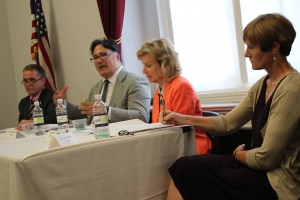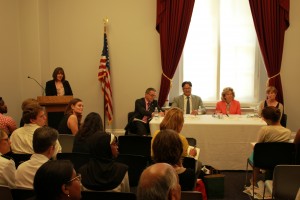Saving Lives Starts with Frontline Health Workers, Congressional Roundtable Told

By Zoe Matza, Frontline Health Workers Coalition
Strengthening the health workforce on the frontlines of care is a must for United States’ global health priorities to be achieved, leadership of the World Health Organization, U.S. President’s Emergency Plan for AIDS Relief (PEPFAR) and USAID told a congressional roundtable on Wednesday.
Across all U.S. global health priorities, including “ending preventable child and maternal deaths, achieving an AIDS-free generation, ensuring global health security, and future agendas like non-communicable diseases, health systems and human resources are the backbone of the response,” Dr. Ariel Pablos-Mendez, assistant administrator for global health at USAID, told a standing-room only audience.
Congressional staff members, Obama Administration officials and global health leaders gathered to hear Dr. Pablos-Mendez, U.S. Global AIDS Coordinator Amb. Deborah Birx, WHO and the Global Health Workforce Alliance’s Dr. James Campbell, and International Medical Corps’ Ann Canavan discuss the state of the frontline health workforce and their importance in furthering progress in global health. The Frontline Health Workers Coalition, International Medical Corps, IntraHealth International, Elisabeth Glaser Pediatric AIDS Foundation, Management Sciences for Health and Save the Children co-hosted the roundtable in cooperation with Reps. Betty McCollum (D-Minn.) and David Reichert (R-Wash.), co-chairs of the Congressional Global Health Caucus.
It is “startling to see that many of the US [government] priority, focus countries are continuously reporting that the biggest bottleneck to accessing care is the health workforce – this frontline health worker,” Dr. Campbell, who directs the WHO health workforce department as well as the Global Health Workforce Alliance in Geneva, said during his overview of the current global health workforce landscape. He added several countries have made substantial progress by focusing investment on scaling up community-based practitioners to deliver a package of essential health services and strengthening the referral system to other health workers.
Recent reports that peg the global health workforce shortage to be at least 7.2 million, possibly more than 10 million, are helpful to make the case to raise the level of focus on the workforce issue, but Dr. Campbell said that a new global strategy on health workforce that WHO is mandated by member states to produce by 2016 must go beyond looking at the shortage to highlight the high return on investment for countries to invest in improving their health workforce.
The need to make the case to focus on health workers more in terms of economics and finance was echoed by Amb. Birx and Dr. Pablos-Mendez. Amb. Birx said that PEPFAR since its inception has helped to train and retain at least 140,000 health workers but added that “better numbers” are needed on health workforce gaps, successful health worker training and deployment, and the economic and social impacts that inadequate access to a quality health workforce has on populations. She added that PEPFAR is working with USAID and other agencies on a strategy to ensure health workforce and health systems issues are being adequately and sustainably addressed not only in U.S. “priority” countries but in all low-income countries.
Dr. Pablos-Mendez said that while the United States’ long history of helping countries strengthen their health workforces has been integral in progress that has allowed 100 million children’s lives to be saved in the last 20 years, there remains much to be done to ensure the health workforce needed to achieve long-term targets. He said better evidence and data is needed to support and drive U.S. government leadership and investment in health workers, but added that the current Ebola outbreak in West Africa has tragically highlighted how weaknesses in frontline health workforces and systems can make responses to global health emergencies far more difficult.
The importance of focusing on workforce deficiencies during public health emergencies like the Ebola outbreak, as well as in conflict and post-conflict settings, was picked up by Ann Canavan, Director of Health Policy and Practice for International Medical Corps (IMC). Through highlighting responses to workforce situations from South Sudan, to Afghanistan to the Ebola-affected countries in West Africa, Canavan said there is an urgent need for better financing, investing, and accountability on addressing workforce issues in emergency settings.
Amb. Birx and Dr. Pablos-Mendez responded to questions about the challenges of funding a cross-cutting intervention like health workforce in an environment of disease-specific funding by noting that a coordinated approach across U.S. global health and development investments is important.
It was heartening to feel the enthusiasm in the room as panelists spoke optimistically and emphatically about the role of USG investment in health workforce development, recognizing the successes and continued need for strong US support and focus on frontline health workers.


